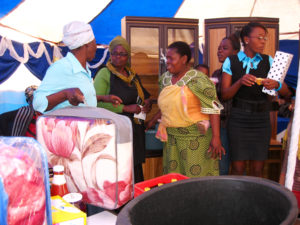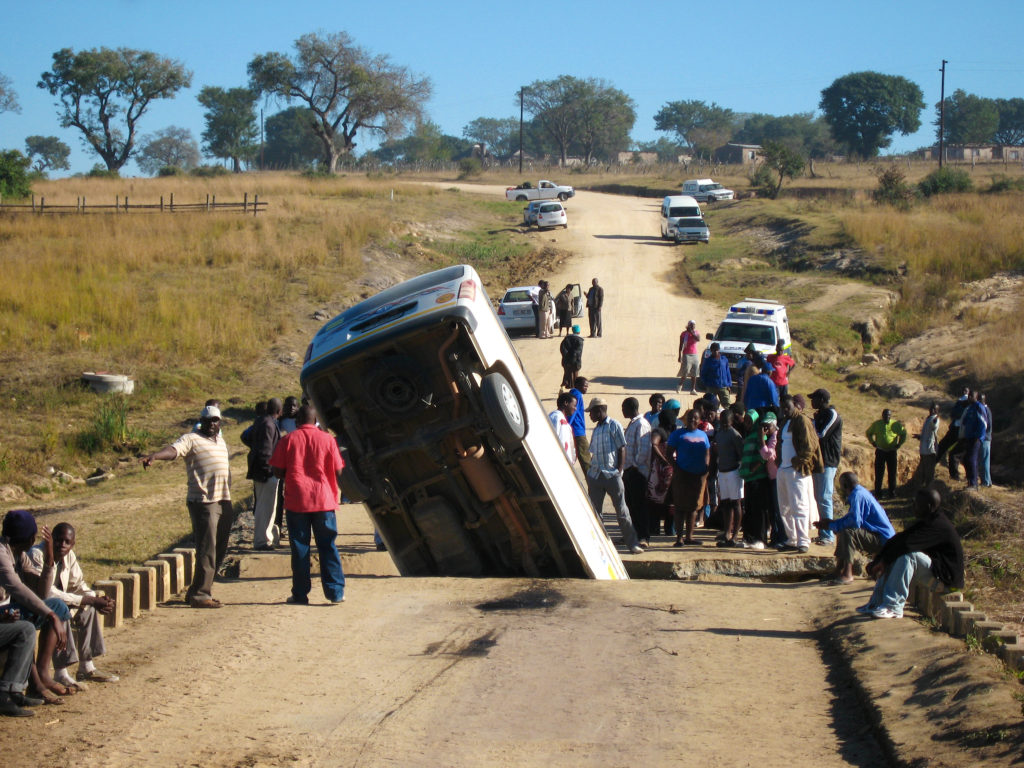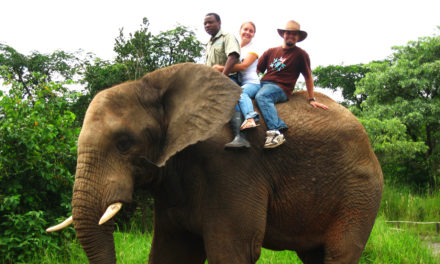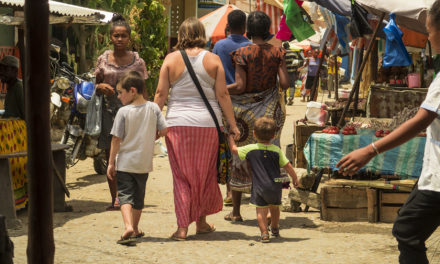A while back, we were at the taxi rank in Pretoria, which is where all the mini-buses for long-distance transport gather, waiting to fill up with people and leave for their destinations. It’s a lot like a bus station, but instead it’s full of white vans (taxis) filling every available space, whether paved or not, and passengers and vendors filling whatever space the taxis aren’t.
The vendors are always walking around selling food for the road and other snacks and drinks and often even some bizarre items like toothbrushes, feather dusters, and belts, as if those were potential last-minute impulse purchases for the taxis’ passengers. And sometimes they are; it’s a funny system.
Taxi ranks are interesting places, always busy, full of people coming and going, usually excited people. The drivers are almost always young men, usually with an attitude as if they own the world. And I guess the freedom to drive on South Africa’s open highways from one province to another, with your own choice of house music thumping loudly the whole way, and being able to pocket several hundred rand (South Africa’s currency) while you’re at it can really feel like owning the world.
So the drivers are milling around in their little groups, acting cool, waiting for passengers to squeeze into the taxi and fill up every last inch of space with their bodies and their luggage. And usually a few passengers have a friend or family member waiting anxiously by the windows, talking to them, buying them any last minute items and waiting to say their goodbyes. And sometimes a woman (young or old) has a small child that she’s putting on the taxi, unaccompanied, and is asking around to find out which passenger is going to the same destination as their child, or at least a nearby destination.
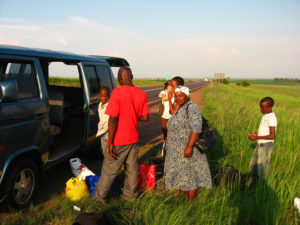
One of the first times we took a taxi from our village to Pretoria, it broke down on the side of the road.
We were sitting in the taxi for Bushbuckridge: it’s a pretty large region, probably several hundred thousand people or more, and with lots of smaller destinations to go to after you get there. After Bushbuckridge, we were going to Thulamahashe, and from there, home to our village – Dumphries B. The trip, including time spent waiting for the taxis to fill up, usually takes around 8 hours, sometimes an hour more or less. This time, there was an unaccompanied child and it turned out that we were the only ones going to a nearby destination.
Of course, the girl didn’t speak any English and by that time, our ability to speak Shangaan was a lot more limited than it is today. We greeted her, introduced ourselves, and asked her name, but the girl was so shy and (perhaps) our ability to speak Shangaan so limited that conversation never progressed beyond that. When we had our single stop along the way for a bathroom break and for food, Lora took her into the girls’ room and we shared some snacks with her. She smiled, but was still too shy to speak. After about 4 hours, her mother called me to ask if we’d arrived yet and I told her we would probably arrive in a couple more hours. Even the girl’s mom didn’t speak that much English (or wasn’t comfortable with it), so it was difficult communicating with her on the phone in Shangaan only.The child was a cute little girl, about 4 or 5 years old, and acted very shy. She was also going to Thulamahashe, and from there to another small village in the area. She had been in the Pretoria area visiting her mother, a visit that probably only happens a few times a year at the most, or possibly even just once every few years. We weren’t familiar with the village where the girl was going nor had we ever before seen the girl or the woman who was putting her on the taxi. But of course we knew Thulamahashe pretty well and since we were the only ones going there, the woman put us in charge of her child. She sat her on the seat next to us, gave us her small bag, asked my name and phone number, gave us 20 rand for the girl’s connecting taxi to Thulamahashe, and that was it. Shortly after, the taxi finished filling up with people and luggage and we were off!
When we did arrive in Thulamahashe, we hadn’t heard back from her mother yet and we really didn’t know what to do with her since we didn’t even know where the village was that was her ultimate destination. For ourselves, we were anxious to get on our own taxi and get home.
So, we asked around, tried to explain the situation, and tried to figure out which taxi to put her on. Thankfully, one lady who’s usually selling snacks near the Dumphries taxi is always very friendly to us. We called the girl’s mom and she seemed to be asking me to get on another taxi and take her home myself. Of course, I wasn’t too keen on this idea since I didn’t even know where I’d be going and I really didn’t want to go out of my way. So, we put the other lady on the phone with her in order to figure out better exactly what was going on. Then, she directed us to another taxi that was supposed to be the right one for the girl.
To our dismay, the other taxi was full. That meant we were going to have to wait for it to leave and for another one to arrive and start filling up. As I said, we were anxious to get on our own taxi and get home after a long day’s travel. But, as we poked our head in and inspected the taxi to see if there was any inch of space left, one older lady saw the little girl who was with us and promptly reached down, picked her up, and put her on her lap.
The old lady certainly seemed to recognize the girl. When we asked, she said she was the girl’s “mother” and she also said she knew where the girl lived. Of course, she looked too old to be the girl’s actual mother, and we were also pretty sure we had just been speaking to the girl’s actual mother on the phone. But she could’ve been any relative, like an aunt, grandmother, or someone like that who in this culture could also take the title of “mother” for the child. Since she’s more of a relation than us who first received the girl at the beginning of the trip, we decided we’d fulfilled our duty, gave the old lady the little girl’s bag and the remainder of her 20 rand and that was it. We called the girl’s mother back to try to explain to her what happened (even though we didn’t even know the old lady’s name) and she seemed pleased enough. It was the last we saw or heard from any of them again.
If you think about it, if we think about it, it was a strange situation. Certainly, you’d never hear of anything like that in America. For starters, our public transportation system isn’t nearly as robust or frequently used; most people take themselves wherever they want to go by driving their own cars. But when a person is on public transportation, they’re usually not packed in so tight and usually don’t feel much of any connection to the people sharing the transport with them, physical proximity or otherwise.
And really, in any public situation, a child, especially a small child, is almost never unattended. Couldn’t a person be charged for neglect for something like that? We even teach children not to “take candy from strangers.” So to send a four- or five-year-old girl across the country in the care of a couple of adults you’d never seen before and who aren’t in any way officially connected to the person/company providing the transport, well, that would be unheard of. To us Americans, this taxi situation would be an impossible one.
I’m sure you’ve all heard, “it takes a village to raise a child.” When we hear that in America, sometimes we can be simply perplexed because it’s only “I”, the direct parent, who’s raising the child and who’s entirely responsible for him/her. Or if not caught off-guard by the statement, it might cause us to think of our societal structures like police and fire department and public education, or we think of it in the larger sense of globalization and an internationalized economy.
But in this culture here, the one shared by most South Africans and probably most Africans in general, it really does take a village to raise a child. It just so happened that on that particular taxi ride, Lora and I were essentially the child’s only fellow villagers. Most children here don’t live with their direct parents. Instead, their parents (by function and by title, “mhaki” and “bava”) are their aunts and (less often) uncles and especially their grandparents (often only their grandmothers). I could count on one hand the number of children I know here who have anything like an appropriately-aged father figure in their lives. And although there are quite a few aunts and especially grandmothers, there are so many more children that it’s just too much work for the few adults to be responsible for everything they need.
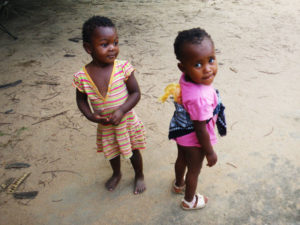
A couple of young girls from our host family, neither of them have their own mother around often. One of them is already practicing taking care of a baby, by tying her toy doll to her back.
The reason is, most fathers are either completely absent from the lives of their children or they’re just physically absent because they’ve moved away somewhere to either work or look for work. But that doesn’t stop anyone from having children. So when it’s time to raise a child, it takes a whole village. Usually a child’s older siblings, even if only older by a few years, are the ones most responsible for watching after them and their general well-being. But any time a child is somewhere else in the village and needs or wants something, whoever’s around will usually give it to them, whether it’s water, fresh fruit, or whatever, they usually get what they ask for from whomever they ask it.
But when living in a village in Africa, in a community-oriented culture, childcare isn’t the only thing the village works together on. In general, any time somebody needs something and somebody else has the skills or the resources to give it to them, they usually do give it to them and they’re even expected to. Of course it’s reciprocal; eventually the one doing the giving now may be the one needing later, and when he or she needs something, they’ll receive it from someone else who has it. So for Lora and me to be involved in a similar exchange of childcare on a taxi actually wasn’t abnormal at all. It’s really quite common, even if it was the first time for us. Chances are good that if we left our own child in a similar situation, our kid would arrive safely at his/her destination just like everyone else.
This works out mostly the same whether it’s something large or small. When it’s harvest time, if someone has specialized in growing peanuts, they give lots of peanuts to most everyone they know. If someone else has had a really good harvest of mielies (maize/corn), they give lots of them to most everyone they know. If someone makes a big pot of leafy vegetables, they often send a bowl of it over to another part of their extended family.
If a young man is finally ready to propose to his future wife (or more accurately, her family), he asks all of his family, his uncles, etc., to give him some money to help pay the lebola (bride price) to her family. And they do, always, without fail, even though the total sum is usually several thousand dollars or more. But that’s why he needs his extended family to help.
It’s also the same with most skills that anyone has: fixing bikes, construction, any bit of knowledge or a helping hand that someone can share with someone else who needs it, they do so freely, especially if it’s a member of their HUGE extended family.
Of course, sometimes people need more money for one-time expenses than most people have lying around to give them. But they’ve worked out a system for that too. There are funeral societies and women’s societies that work pretty well. Basically, a group of women, usually anywhere from 10 to 30 of them, join a “society”, either a general one for women (since they’re usually the acting heads of households), or a specific one for funerals. Every month, they meet together to socialize and pay their dues, which is usually a small enough amount for each individual woman, but a rather large amount when taken together.
If it’s a funeral society, the money collected is given to any woman who’s in charge of a funeral that month, or divided among them if it’s more than one, sometimes even going beyond the standard monthly amount if that month has extra need. If there are no funerals that month, the money stays in storage until it’s needed for a funeral. It’s basically a community-run life insurance.
If it’s a regular society, then every woman is scheduled to have “her own month” at a regular interval, usually once every year or two years. Every month is one of the women’s turn. On her turn, the other women throw a party for her and either give her all the money gathered that month (especially if she has bills to pay), or buy gifts for her (usually large household items) with the money from that month. It essentially works out to be a community savings account, preventing the women from spending their money in the meantime and eliminating their need to keep track of it, but still giving payouts to each woman at scheduled intervals. It’s the same idea as the rest of the community-focused helping each other out, only scheduled and organized so as to work for larger sums of money. And all of these things seem to be very effective here. I’ve never heard anyone complain about the results.
Of course, we have similar situations in the USA, right? We have insurances and charities and welfare and savings accounts and all the rest, to provide for people’s needs and security. And I think those are similarly community-focused ideas, just like here in South Africa. Only they don’t usually work the same way. They’re usually institutionalized, or capitalized, or riddled with bureaucracy, and at the end of the day, people rarely seem to benefit the same way.
The community-focused ideas that started these things seems to be taken up by individually-focused people and exploited for quick profit (like insurance and savings/investment accounts), or they become so legislated and controlled by a few (the few that are directly involved) that special allowance can never be made for special circumstances. A lot of the resources collected are often wasted just because one actually unnecessary instance fits the profile and the one giving the “help” doesn’t know the recipient well enough to know they don’t need it. Or maybe sometimes people just give money to a charity and assume they’ve “done their part” for their community without putting any time or other thought into it, thereby placing the burden of a lot of work on the shoulders of just a few.
But when it’s all said and done, most people are just looking at what’s in it for themselves. And they forget that they’re part of a community and that these structures they’re a part of financially (welfare, investment, insurance, charity, and the rest) are the result of joint effort and combined resources and that they certainly can’t be effective when the community focus that inspired them is forgotten in the interest of the individuals controlling them and supporting them.
And so they’re usually very ineffective – I think health insurance is the best example of that. It started off essentially the same way funeral societies work here: everyone pooled their money each month and whoever had need of it for healthcare bills received as much as they needed. But eventually it lost connection with the people who comprised it and now it only exists to help its money-makers at the top profit off of society’s fear of rising healthcare costs, and a person rarely receives what they actually need from it.
In the end, people feel like, “the only one I can really trust and rely upon is myself,” and that correspondingly, “no one else should be relying on me, but instead they should also be relying upon their own selves.” It’s a vicious cycle and eventually any community-centered motivations get distorted grossly or neglected entirely.
There’s no way that South Africa, or our village here in South Africa, is perfect in these regards either. It used to be that when marulas (an indigenous fruit) were plentiful and ripe, everyone would gather them and make their own batch of marula beer (“vukanyi”) and then invite all their friends and neighbors over to celebrate and share it with them. But that rarely happens anymore. Now, most people don’t share vukanyi for free, instead they send someone to go sell it by the roadside. And because South Africa’s current legislation gives social grants (i.e. welfare) pretty indiscriminately, there are plenty of out-of-work alcoholics with a little bit of money to buy some cheap traditional beer.
Nowadays, many of the elected officials and contractors in South Africa have developed such a distance from their home communities that they don’t mind exploiting public budgets intended for development work and they use the money to line their own pockets instead. Unfortunately, much of South Africa’s traditional community-focused approach is giving way to a much more globalized individualistic approach.
But that community-centered focus is still far from gone in areas like ours. Wherever people still feel like they belong to their community, they still treat their community like it’s part of them, giving and taking when there’s need and respecting their own community enough not to exploit them or be exploited by them. There’s all the examples I mentioned, but there’s also many more. I remember one time when a family from our church here had a son that died. That Sunday the whole church moved the service to that family’s house rather than leave the family alone or make them move around too much during their time of grieving. I think that was a great demonstration of community.
However, it’s true that being more community-focused or more individually-focused is mostly just an aspect of culture. Emphasizing one over the other isn’t necessarily the “right” thing to do and Americans aren’t necessarily wrong because they prefer to focus on the individual rather than the community. But losing one or the other entirely can be very damaging to societies and to individuals. Both focuses have their place.
Personally, I think we’ve lost too much of our community-focus in America, and I think it’s seriously damaging many aspects of our society that were founded on that, as I’ve already mentioned. But I think one place we should really be able to re-gain community focus in America is in the church. Members of churches should be part of their own community. Within that community, they should be more than willing to help each other out with funerals, healthcare costs, weddings, food supply, and anything else really.
Unfortunately, it seems that churches in America are rarely like that. Instead, our churches often reflect our society. We show up, we watch someone talking, just like we do with politicians on TV, or if entertainment’s our thing, we show up to watch someone make jokes or to hear good music, maybe we vote on some issues some times, and then we go home, rarely communicating much with the other members throughout the week.
If someone at church needs something, maybe we’ll give some money; certainly many pay their taxes/tithes to the church. But few church-goers are actively involved with a significant amount of their time or skills and few church leaders make serious attempts to involve them. Instead, it seems most people are content with the spectator / speaker format, or what you might call the “media format” (since it works the same way as the rest of the media we consume on a regular basis) and few are involved in anything like a community.
So then, where’s the opportunity for the church in America to re-gain a community focus that’s been lost? Well, I think it can easily work the same way as communities do here. Though I’m not at all related to anyone here by blood, they can still call me “bava” (father) or “bhuti” (brother) because they know I’m part of their community. Not that the titles themselves are what’s important, but it’s the recognition of relation. A church doesn’t have to be built on blood-related family members (though it can be), but an even stronger relation: we’re all adopted sons and daughters of Jesus. The blood that we share is his, it’s his Holy Spirit.
As a member of a community here, if someone needs my services, I give to them. Whether it’s pumping soccer balls and bicycle tires 20 or 30 times a day (because we’re apparently the only ones with a pump), or whether it’s fixing decades-old computers as well as I can, or whether it’s giving chili peppers from my garden to anyone who wants them, I offer my time and skills and resources to anyone in my community that has need.
Why shouldn’t the American church be like that? We’re all supposed to be brothers and sisters, mothers and fathers of each other. And we all have our own skills and services, our own resources. So why can’t we offer them freely to those in our community who need them? It’s probably because we don’t know them and we don’t know if we’ll be exploited by them. But what’s preventing us from coming to know them? Why can’t we trust them the same way God has entrusted us with everything we have and everything we are?
I don’t think the “media format” version of church has much to do with the real church, at least no more than a separated windpipe, tongue and lips, with a huge crowd of separated ears for hearing, has to do with a real whole human. As it’s written in 1 Corinthians chapter 12, we’re all members of one body. And as members of the same body, we should all be different functioning parts. No function of the body is simply spectating only, and a head has only two eyes and only two ears. We should ALL function. Every one of us – and that means time and skills and relationship, in addition to resources.
Our gathering together should be to know each other, and to use our differentiated skills and resources wherever they’re needed. And they’re all needed: “the eye cannot say to the hand, ‘I have no need of you’”. Instead, “if one member suffers, all suffer together with it; if one member is honored, all rejoice together with it.”
So as a community, as adopted brothers and sisters, as members of the same body, we should all be working together for the greatest honor of every member, and for the greatest honor of the head, Jesus. If we’re not working together, then what are we really a part of? It takes a village. That village should be us.

